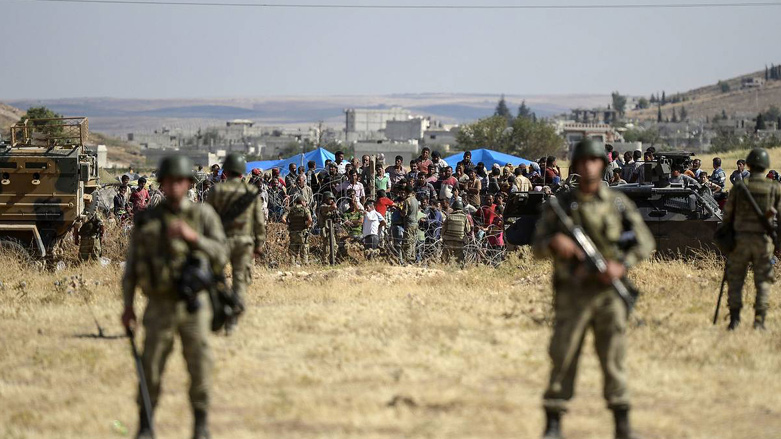US says no YPG in Syria safe zone as questions persist

WASHINGTON DC (Kurdistan24) – Amb. James Jeffrey, US Special Representative for Syria Engagement and Special Envoy for the Global Coalition to Defeat ISIS, spoke to the State Department press corps on Monday about the latest developments in the battle against the Islamic State, after the territorial defeat of the terrorist organization’s so-called caliphate was announced over the weekend.
Jeffrey’s statements suggested that the US was still trying to balance between two conflicting imperatives: addressing Turkey’s concerns about the Kurdistan Worker’s Party (PKK) while protecting America’s Kurdish allies in the Syrian Democratic Forces (SDF), America’s main partner in the fight against the Islamic State in Syria.
The Kurdish People’s Protection Units (YPG) are an important part of the SDF, but Turkey claims it is the Syrian wing of the PKK.
Asked “what will happen to protect the Kurds,” after the planned US drawdown, Jeffrey responded, “We’re working” with Turkey“ to have a safe zone of some length along the Turkish border, where there would be “no YPG forces.”
“Turkey feels very nervous about the YPG and their ties to the PKK. We understand that,” Jeffrey continued. “President Trump has made that clear to [Turkish] President Erdogan.”
“But we also do not want anyone mishandling our SDF partners, some of whom are Kurds,” Jeffrey continued. In fact, the military leadership of the SDF is Kurdish, and the SDF’s top commander, Mazloum Kobani, is Kurdish.
In announcing the end of the territorial fight against the Islamic State, the SDF revealed that it had lost over 11,000 fighters dead with another 21,000 wounded. As The Washington Post’s Liz Sly observed, that “is more than a fifth” of the SDF at “peak strength,” the equivalent of the US military “losing around 250,000 soldiers.”
Paul Davis, a former Pentagon analyst and currently a Senior Fellow at Soran University, expressed his surprise over the new US plan for the Syrian safe zone. “Without the YPG, the safe zone won’t work,” Davis told Kurdistan 24. “What are they going to do? Use Turkish proxies?”
Yet Davis condemned the pro-Turkish militias. “Many are Islamic extremists,” he said, and “they lack any sort of discipline.” He noted that both the United Nations, as well as the State Department, have strongly criticized Turkey and its militias for human rights abuses, even war crimes, committed during their January 2018 assault on the Kurdish city of Afrin.
Jeffrey also presented a new picture of the role of US along with British and French forces in the planned security zone. Previously, it was thought that a few hundred US troops would remain in northeastern Syria as a “small part of an observer force,” as National Security Adviser John Bolton put it earlier this month, along with a similar number in southeastern Syria at al-Tanf, with their numbers bolstered by allied troops.
However, Jeffrey said on Monday that while “very limited numbers” of US forces would remain in the northeast and at al-Tanf, they would continue to have a “Defeat-ISIS” mission. “It’s not to operate in any safe zone,” he added.
But then who will ensure the safety of the safe zone? Not only must the YPG be an integral part of any safe zone, in Davis’ view, but coalition troops must be situated between the Turkish forces to the north, and the SDF, including the YPG, to the south, “so the two sides do not clash.”
Jeffrey did clarify some important points about the nature of the Islamic State. He repeatedly stressed that “the majority” of the Islamic State’s fighters are Iraqis or Syrians, as opposed to foreigners, “who have come from outside the region.”
That is pretty much what Dr. Najmaldin Karim, former governor of Kirkuk Province, told Kurdistan 24: most of the Islamic State is “definitely local” people.
Foreigners have been captured or forced to flee, but not the locals, who have gone underground. That is what constitutes the danger posed by “sleeper cells” and the threat of the Islamic State’s resurgence.
“What was called the liberation of Hawija,” Karim said, as he discussed a town in Kirkuk Province, which he knows very well, “was basically these people shaved, threw the dishdasha, threw their things, went to their homes, and now they’re being reactivated and are active again.”
Asked by Kurdistan 24 to compare the threat of the Islamic State in Iraq and in Syria, Jeffrey explained that the threat “is developed more in Iraq.”
“The fight is fresh in Syria, and ISIS elements are in shock from having lost this terrain,” he continued. “In Iraq, they’ve had more time to reconstitute,” even as he stressed that the terrorist group operates “in the shadows, as a low-level insurgency.”
“They’re not holding terrain, they’re not controlling populations,” he concluded.
Editing by Nadia Riva
